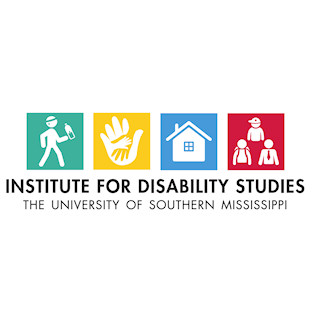The Institute for Disability Studies (IDS) is proudly housed on both the Hattiesburg and Gulf Park campuses of the University of Southern Mississippi (USM). We are Mississippi’s University Center for Excellence in Developmental Disabilities (UCEDD). IDS’s work is focused on enhancing the quality of life for Mississippians with disabilities and their families. For nearly 50 years, we have promoted independence, productivity, and community inclusion for people with disabilities statewide through the provisions of training, technical assistance, service, research, and information-sharing.
Our work spans three core areas: Education, Community Living, and Family Engagement.
As of May 2025, IDS proudly operates 20 programs within these core areas, each with their own unique purpose to serve our disabled community and their families. These programs are as follows: STEP UP Hattiesburg, STEP UP Gulf Coast, STEP OUT, RISE TTT! Southern Miss, Community Volunteer Club, Empowering Pathways to Independence in Communities, Adaptive Sports Southern Miss, SO College Southern Miss, Advocacy Entrepreneurship, Wounded Warrior Independence Program, Learn the Signs. Act Early., LEND, ToTAL (Transition of Teens to Adult Life), Southeast ADA, Preservice Enhancement for Occupational Therapy Students, Project Recovery, Family Advocacy, Pathway Weavers, Job Extravaganza, Family Advocacy Network, Getting Employable Today (GET), START, Autism Support Specialists, and Customized Employment Specialists.
For more information on our programs or general questions, we invite you to contact our main office by phone at 601-266-5163, or by email at idsadmin@groups.usm.edu.
For more information on our Inaugural Golf Tournament, please contact Amy James, Executive Coordinator for Philanthropy and Development, by phone at 601-266-4435, or by email at amy.james@usm.edu. We look forward to your continued support as we strive to make Mississippi a more inclusive state for individuals with disabilities and their families.

